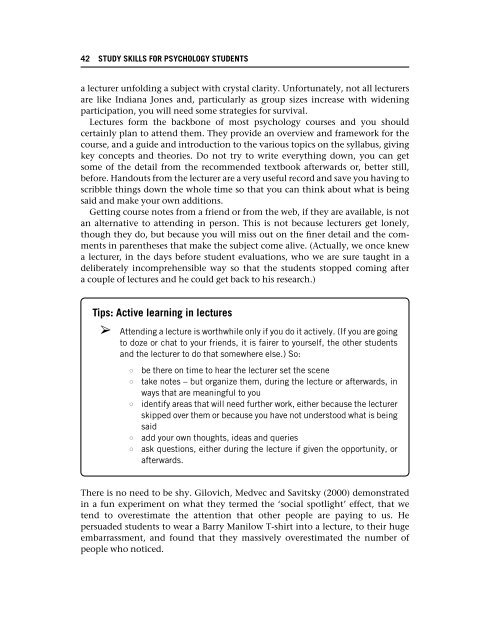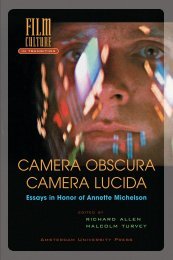Psychology - Forgot your username
Psychology - Forgot your username
Psychology - Forgot your username
You also want an ePaper? Increase the reach of your titles
YUMPU automatically turns print PDFs into web optimized ePapers that Google loves.
42 STUDY SKILLS FOR PSYCHOLOGY STUDENTS<br />
a lecturer unfolding a subject with crystal clarity. Unfortunately, not all lecturers<br />
are like Indiana Jones and, particularly as group sizes increase with widening<br />
participation, you will need some strategies for survival.<br />
Lectures form the backbone of most psychology courses and you should<br />
certainly plan to attend them. They provide an overview and framework for the<br />
course, and a guide and introduction to the various topics on the syllabus, giving<br />
key concepts and theories. Do not try to write everything down, you can get<br />
some of the detail from the recommended textbook afterwards or, better still,<br />
before. Handouts from the lecturer are a very useful record and save you having to<br />
scribble things down the whole time so that you can think about what is being<br />
said and make <strong>your</strong> own additions.<br />
Getting course notes from a friend or from the web, if they are available, is not<br />
an alternative to attending in person. This is not because lecturers get lonely,<br />
though they do, but because you will miss out on the finer detail and the comments<br />
in parentheses that make the subject come alive. (Actually, we once knew<br />
a lecturer, in the days before student evaluations, who we are sure taught in a<br />
deliberately incomprehensible way so that the students stopped coming after<br />
a couple of lectures and he could get back to his research.)<br />
Tips: Active learning in lectures<br />
➢ Attending a lecture is worthwhile only if you do it actively. (If you are going<br />
to doze or chat to <strong>your</strong> friends, it is fairer to <strong>your</strong>self, the other students<br />
and the lecturer to do that somewhere else.) So:<br />
be there on time to hear the lecturer set the scene<br />
take notes – but organize them, during the lecture or afterwards, in<br />
ways that are meaningful to you<br />
identify areas that will need further work, either because the lecturer<br />
skipped over them or because you have not understood what is being<br />
said<br />
add <strong>your</strong> own thoughts, ideas and queries<br />
ask questions, either during the lecture if given the opportunity, or<br />
afterwards.<br />
There is no need to be shy. Gilovich, Medvec and Savitsky (2000) demonstrated<br />
in a fun experiment on what they termed the ‘social spotlight’ effect, that we<br />
tend to overestimate the attention that other people are paying to us. He<br />
persuaded students to wear a Barry Manilow T-shirt into a lecture, to their huge<br />
embarrassment, and found that they massively overestimated the number of<br />
people who noticed.






